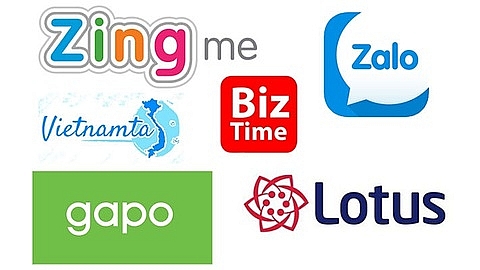Local social networking sites shaken by draft amendment
 |
| Over 500 small local social networking sites may have to apply for a permit to continue earning money from their services |
Social networking sites with more than one million users or 10,000 interactions a month will have to get licensed through the Ministry of Information and Communications (MIC) to operate in the country, according to Article 23 of the draft amendment to Decree No.72/2013/ND-CP outlining the management, provision, and use of internet services and online information.
Moreover, only licensed platforms will be allowed to charge subscription and usage fees, not even for live-streaming.
At the end of December 2019, Vietnam had 614 social networking sites, less than 10 per cent of which had more than one million users. Thus, the remaining 90 per cent (more than 500 platforms) do not satisfy the requirements to charge users.
The draft also mentioned that sites with less than one million users or 10,000 interactions a month would have to file a document to the appropriate authorities to get permission to maintain operations.
Discussing with VIR, Trinh Minh Giang, CEO of Venture Management Consulting Group specialised in tech startups, said that small-scale platforms will find it more difficult to earn revenue than their larger counterparts. Accordingly, setting up a social network requires large investment and even the largest local platforms in Vietnam have yet to turn a profit. The common difficulty for local social networks is luring in more users to generate larger revenue streams – which they do by generating user data to attract advertisers. As a result, social networks of a small scale (less than one million users) have been struggling to survive in the race against Facebook and Google's YouTube.
Hence, the amendment would not resolve the issues facing small-scale platforms which heavily outnumber larger platforms in Vietnam. Therefore, Giang advised consulting the related laws of other countries, especially those which have succeeded in creating a win-win situation for both the government and companies, before outlining similar rules in Vietnam. “This will allow the platforms to be hit less by new regulations.”
On the other hand, the draft does not fully cover the gaps related to overseas platforms such as Facebook and YouTube which have been operating in Vietnam without licenses and gathered the lion's share of the country's advertising market.
Indeed, local social networks running in Vietnam without licenses or with expired licenses are fined for VND20-30 million ($870-1,300) following Article 63 of Decree No.174/2013/ND-CP stipulating the administrative sanctions in the telecommunication and postal services. Similar to the latest draft, it has no clauses related to violations by overseas platforms.
Consequently, local platforms have been disadvantaged compared to international players for a long time. Even if the new rules could be extended to overseas platforms, the sanctions are tiny compared to their earnings in Vietnam and would prove little deterrent.
Responding to VIR, Nguyen The Trung, deputy head of Technology Solutions and Security for Local E-government, said that based on the $15-20 Facebook earns from each local user, the social network earns about $1 billion a year in revenue in Vietnam. Similarly, Google ranked second with the annual revenue of hundreds of millions of US dollar.
Previously, the MIC also promised to take the necessary technical measures in case Facebook shows no willingness to comply with Vietnamese regulations. According to Giang from Venture Management Consulting Group, there should be discussions between the drafting board and representatives of overseas social networks so that the appropriate sanctions can be worked out that would help balance the benefits of operators and business users of these platforms.
“If the platforms are forced to terminate their operations in Vietnam because they do not have licenses, these users will be the first to suffer. They will lose a great deal of important data related to their business, and lose an effective business tool,” said Giang. “The drafting board should also work with international experts to research policies of nations with an effective online environment.”
Otherwise, assessing the current sanctions under Decree 174, Giang said that the local government encourages the development of "Made in Vietnam" platforms, so local platforms, especially small-scale ones, will be supported.
“Social networks could get a fine of medium severity for their first violation of the new rules, which would then increase for the next infractions,” said Giang.
What the stars mean:
★ Poor ★ ★ Promising ★★★ Good ★★★★ Very good ★★★★★ Exceptional
Related Contents
Latest News
More News
- VNPAY and NAPAS deepen cooperation on digital payments (February 11, 2026 | 18:21)
- Vietnam financial markets on the rise amid tailwinds (February 11, 2026 | 11:41)
- New tax incentives to benefit startups and SMEs (February 09, 2026 | 17:27)
- VIFC launches aviation finance hub to tap regional market growth (February 06, 2026 | 13:27)
- Vietnam records solid FDI performance in January (February 05, 2026 | 17:11)
- Manufacturing growth remains solid in early 2026 (February 02, 2026 | 15:28)
- EU and Vietnam elevate relations to a comprehensive strategic partnership (January 29, 2026 | 15:22)
- Vietnam to lead trade growth in ASEAN (January 29, 2026 | 15:08)
- Japanese business outlook in Vietnam turns more optimistic (January 28, 2026 | 09:54)
- Foreign leaders extend congratulations to Party General Secretary To Lam (January 25, 2026 | 10:01)

 Tag:
Tag:























 Mobile Version
Mobile Version